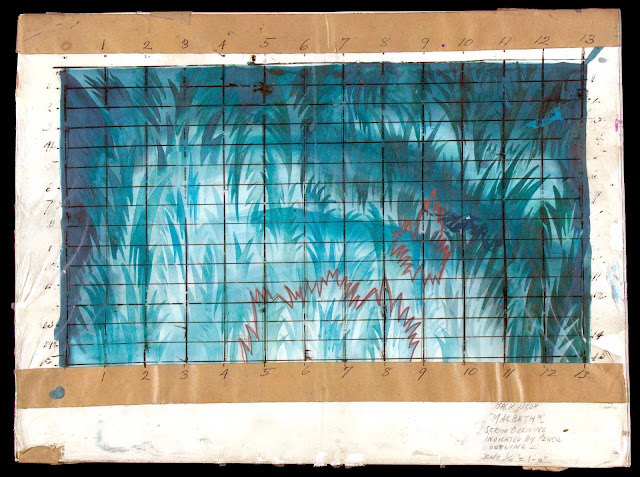In the lead-up to Love Goddess, which starts rehearsals next week, I've been doing a little research into some of the Orson Welles stuff I know less about, and found this photo of his first ever professional job as director. Before I get into that however, I have a question: In 1948 he made a film of Macbeth*, and "to save time" he decided to record audio of all his actors speaking their lines first, then film them lip-syncing to it like a music video, and I have no idea why. I know about recording dialogue and image separately, and obviously Welles did too – half his output is him re-recording other actors' lines – but why this way round? Did other directors do this?
Was he just not sure he'd be able to get the actors back?
The result is probably the stage-iest film of Shakespeare I've seen, including those actually set on a stage. Here's a watermarked still from it. See if you recognise the set...
It's the same arch and staircase configuration as the picture at the top. That was from Welles' first Macbeth – indeed his first anything – a Depression jobs programme from the Federal Theatre Project employing a hundred-and-thirty-seven black actors and stagehands, and one wild-eyed white, pipe-smoking twenty-year-old who decided to set the whole thing in Haiti.
The way Welles talks about the "Voodoo Macbeth", even making his first film Citizen Kane a few years later feels like a come-down, and one can see why when you watch the four minutes preserved of it in the newsreel below. To go from nothing to this... (I think they may have added a line not in the original Shakespeare by the way. See if you can spot it.)
Unlike the arch and stair combo, the brilliant line "Ha Ha Ha Ha Ha! My Name's Macbeth!" did not alas make it in to the 1948 film, which consequently has very little to match this production's energy. It's just occured to me it might not originally have appeared in this production either, but simply been added for the newsreel to give viewers unfamiliar with the play some clue as to what's going on. The later film did, however, also end
with the witches' return and the line: "Peace, the charm's wound
up!" although I think "wound up" here means ready to go, like a clock, rather
than finished like a story, so I'm not sure why it's at the end of
either. Pessimistic circularity? Did Welles innovate that? The actor absolutely killing it with that line, as Hecate the god of witches, is Eric Burroughs, whose son recently wrote a graphic novel all about the production here, which I think they might be turning into a movie here. Further fantastic reminiscences follow. Enjoy:
*UPDATE: I've just found the whole film – each helmet siller than the last – up on youtube HERE.



No comments:
Post a Comment